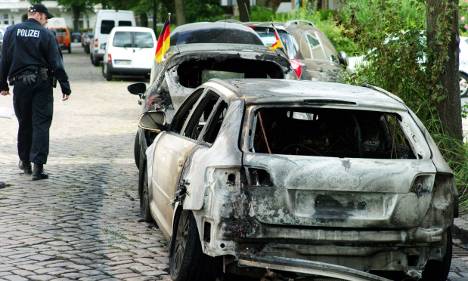Five cars in the Hohenfelde district went up in flames, a spokesperson said. Another four cars were damaged by the extreme heat of nearby cars on fire.
A nearby resident awoke to the sound of explosions and alarmed rescue services, while another resident reportedly saw a man leave the scene of the crime. But an immediate police search was fruitless.
The incident came just one night after three cars were burned and another damaged by flames in the Hamm-Nord district.
The arson, which is becoming increasingly common in both Hamburg and Berlin, did not cause any injuries.
So far there are no suspects in the most recent cases, and there is no evidence to suggest the crimes were politically motivated, authorities said.
Car burnings are often associated with anti-capitalist protest by leftists in Germany, with luxury autos a favourite target.
Hamburg has seen more than 70 car burnings in 2010, police spokesperson Ralf Meyer said, adding that few of these were found to have been inspired by left-wing ideology. Last year 150 cars burned in the city.
Motives often include simple vandalism, relationship quarrels, insurance fraud or attempts to cover up evidence of other crimes, he said.
In early April suspected left-wing arsonists destroyed some 16 parked vehicles in Hamburg’s Flottbeck and Harvestehude districts.
The authorities in Germany are becoming increasingly worried over the apparent willingness for violence by leftist anarchists. Several police officers were injured in Berlin last weekend after they were hit by a homemade explosive device during a political demonstration.



 Please whitelist us to continue reading.
Please whitelist us to continue reading.
Member comments